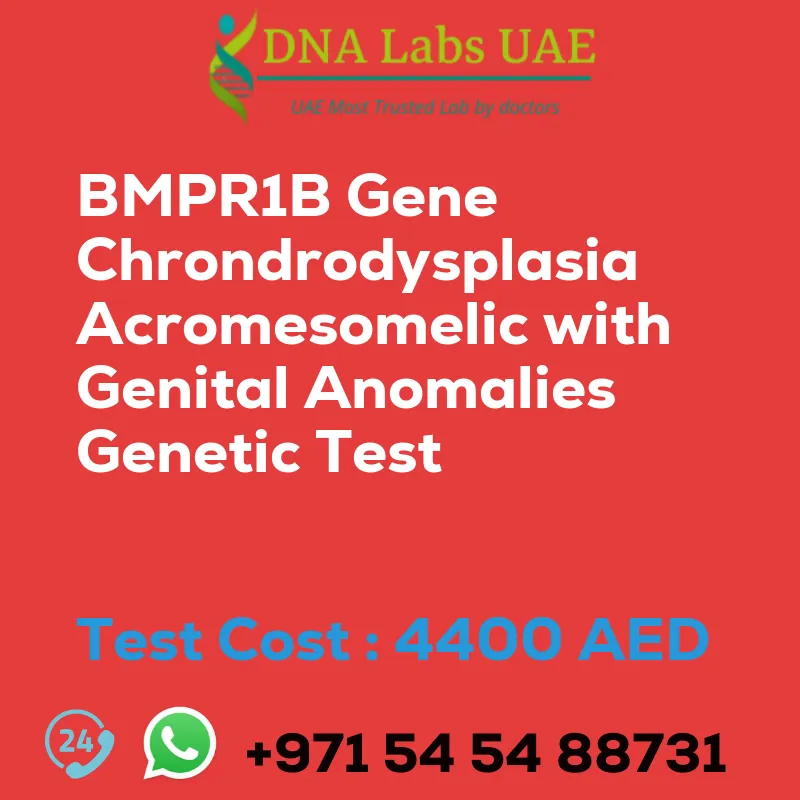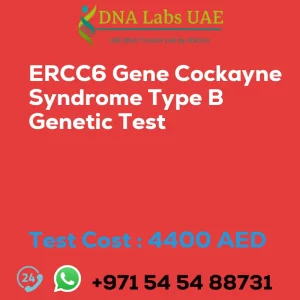BMPR1B Gene Chrondrodysplasia acromesomelic with genital anomalies Genetic Test
Test Details
BMPR1B gene chondrodysplasia, acromesomelic, with genital anomalies is a genetic disorder that affects skeletal development and genital development. It is caused by mutations in the BMPR1B gene, which provides instructions for making a protein involved in bone and cartilage development.
NGS (Next-Generation Sequencing) genetic testing is a type of genetic test that uses advanced sequencing technologies to analyze multiple genes simultaneously. In the case of BMPR1B gene chondrodysplasia, acromesomelic, with genital anomalies, NGS genetic testing can be used to identify mutations in the BMPR1B gene that may be responsible for the disorder.
NGS genetic testing involves obtaining a DNA sample, usually through a blood sample or a cheek swab, and then sequencing the DNA to identify any variations or mutations in the BMPR1B gene. This can help confirm a diagnosis of the disorder and provide information about the specific genetic mutation present in an individual.
Genetic testing can be useful in diagnosing and managing genetic disorders, as it can provide information about the underlying cause of a condition and help guide treatment decisions. It can also be used for carrier testing, prenatal testing, and family planning purposes.
It is important to consult with a healthcare professional or a genetic counselor to discuss the benefits, limitations, and potential risks of genetic testing before undergoing the test. They can provide guidance on whether genetic testing is appropriate in a specific situation and help interpret the results.
Test Name: BMPR1B Gene Chrondrodysplasia acromesomelic with genital anomalies Genetic Test
Components:
- Price: 4400.0 AED
- Sample Condition: Blood or Extracted DNA or One drop Blood on FTA Card
- Report Delivery: 3 to 4 Weeks
- Method: NGS Technology
- Test type: Dysmorphology
- Doctor: Pediatrics
- Test Department: Genetics
Pre Test Information
Clinical History of Patient who is going for BMPR1B Gene Chrondrodysplasia, acromesomelic, with genital anomalies NGS Genetic DNA Test. A Genetic Counselling session to draw a pedigree chart of family members affected with BMPR1B Gene Chrondrodysplasia, acromesomelic, with genital anomalies NGS Genetic DNA Test gene BMPR1B.
Thank you for reading our blog post on the BMPR1B Gene Chrondrodysplasia acromesomelic with genital anomalies Genetic Test. If you have any further questions or would like to schedule a genetic test, please contact DNA Labs UAE.
| Test Name | BMPR1B Gene Chrondrodysplasia acromesomelic with genital anomalies Genetic Test |
|---|---|
| Components | |
| Price | 4400.0 AED |
| Sample Condition | Blood or Extracted DNA or One drop Blood on FTA Card |
| Report Delivery | 3 to 4 Weeks |
| Method | NGS Technology |
| Test type | Dysmorphology |
| Doctor | Pediatrics |
| Test Department: | Genetics |
| Pre Test Information | Clinical History of Patient who is going for BMPR1B Gene Chrondrodysplasia, acromesomelic, with genital anomalies NGS Genetic DNA Test. A Genetic Counselling session to draw a pedigree chart of family members affected with BMPR1B Gene Chrondrodysplasia, acromesomelic, with genital anomalies NGS Genetic DNA Test gene BMPR1B |
| Test Details |
BMPR1B gene chondrodysplasia, acromesomelic, with genital anomalies is a genetic disorder that affects skeletal development and genital development. It is caused by mutations in the BMPR1B gene, which provides instructions for making a protein involved in bone and cartilage development. NGS (Next-Generation Sequencing) genetic testing is a type of genetic test that uses advanced sequencing technologies to analyze multiple genes simultaneously. In the case of BMPR1B gene chondrodysplasia, acromesomelic, with genital anomalies, NGS genetic testing can be used to identify mutations in the BMPR1B gene that may be responsible for the disorder. NGS genetic testing involves obtaining a DNA sample, usually through a blood sample or a cheek swab, and then sequencing the DNA to identify any variations or mutations in the BMPR1B gene. This can help confirm a diagnosis of the disorder and provide information about the specific genetic mutation present in an individual. Genetic testing can be useful in diagnosing and managing genetic disorders, as it can provide information about the underlying cause of a condition and help guide treatment decisions. It can also be used for carrier testing, prenatal testing, and family planning purposes. It is important to consult with a healthcare professional or a genetic counselor to discuss the benefits, limitations, and potential risks of genetic testing before undergoing the test. They can provide guidance on whether genetic testing is appropriate in a specific situation and help interpret the results. |








